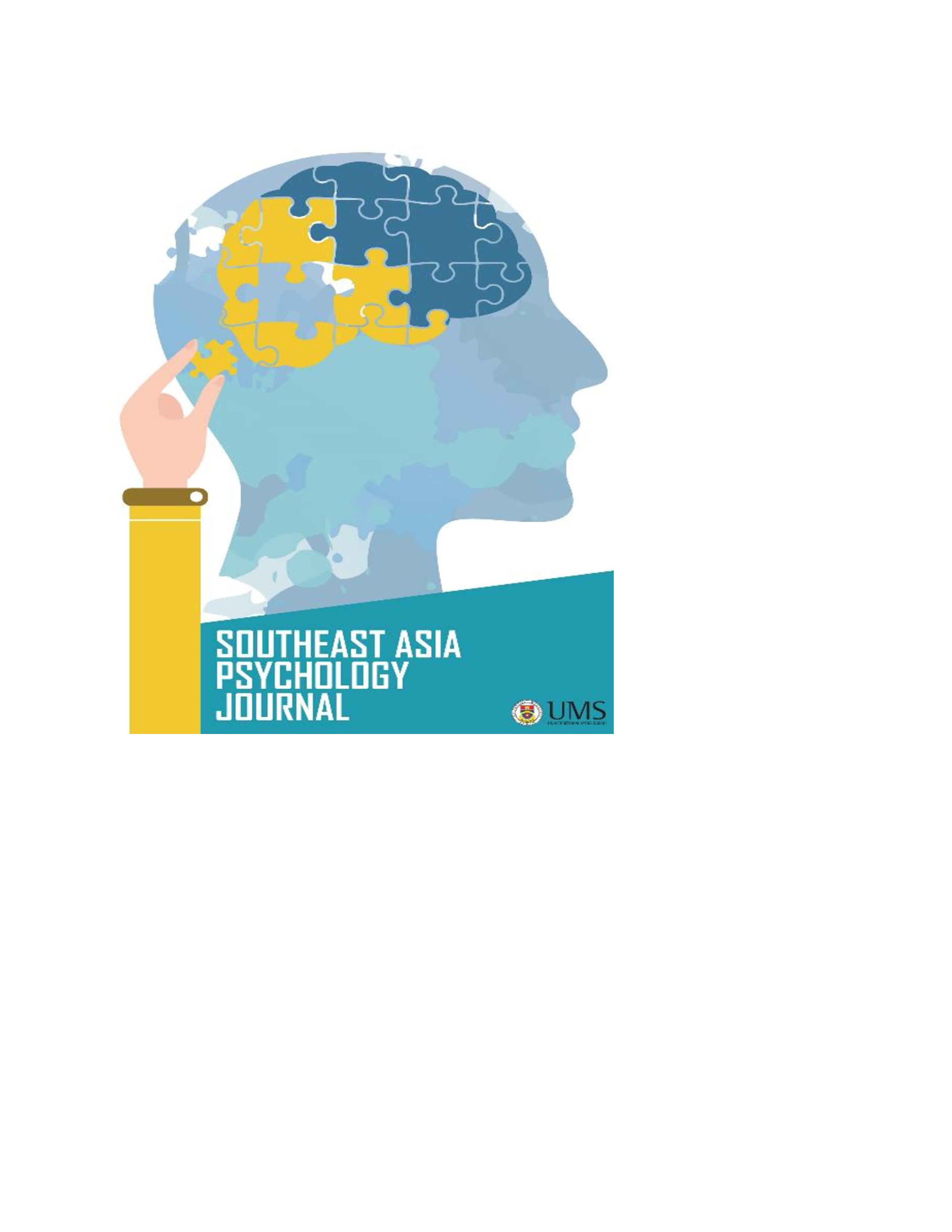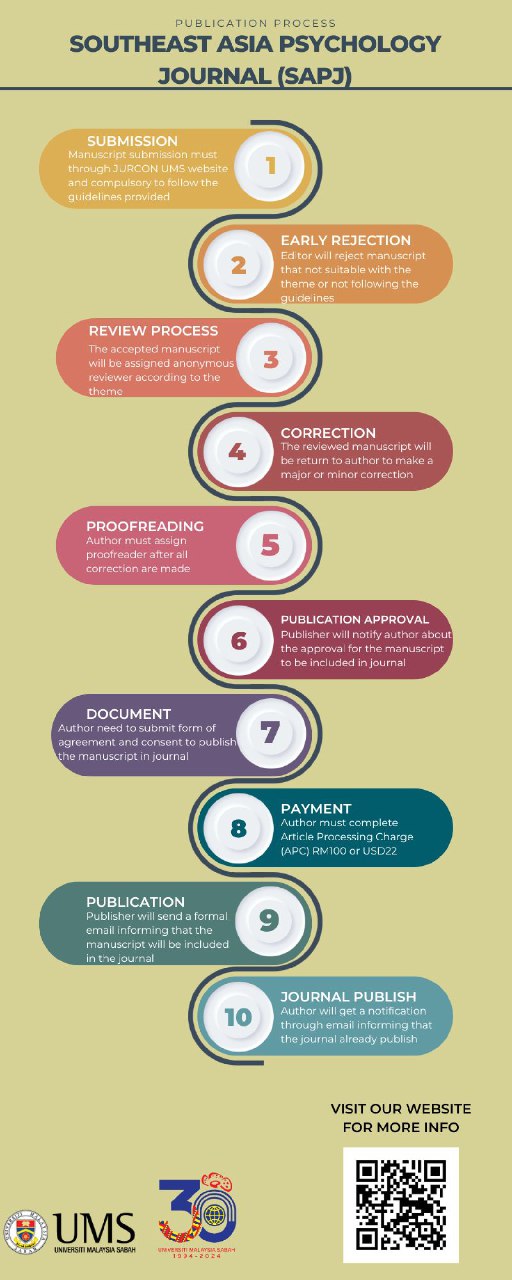SOCIAL SUPPORT AMONG SYSTEMIC LUPUS ERYTHEMATOSUS (SLE) PATIENT IN MALAYSIA
DOI:
https://doi.org/10.51200/sapj.v11i2.4907Keywords:
social support, demographic characteristics, systematic lupus erythematosus, MSPSS, SLE patientAbstract
This research aims to look at the social support available for Systemic
Lupus Erythematosus (SLE) patients and its relationship with sociodemographic
and psychological factors at Universiti Kebangsaan Malaysia
Medical Center, Kuala Lumpur, Malaysia. A total of 150 patients with SLE who
are seeking treatment have filled the questionnaires distributed and consisted of
26 male patients and 126 female patients with a ratio (cross-sectional sectional
study using convenience sampling was conducted where the MSPSS
questionnaires (Multidimensional Scale of Perceived Social Support) was used
to measure the social support scores while Hospital Anxiety and Depression
(HADS) was used to measure the psychological aspect obtained by the patient.
The social support overall showed a significant relationship only with the
monthly income. Family social support were significantly related to ethnicity
and income, friends' social support was seen to have a significant relationship
with education and income, whereas else there is no significant relationship
between significant other social support with demographic characteristics of
patient with SLE. Their result showed that there was a negative strong
significant relationship between social support overall, social support from
family, social support from friends and social support from a significant other
with a score of anxiety and depression. All the test results showed p<0.000 and
r>-0.6. This means that there is a significant relationship between social
support, family social support, friend social support and social support of special
friends with the occurrence of anxiety and depression experienced by patients
with SLE.
References
Abramovitz M. (2008). Lupus: Disease and disorder. Thomson Gale:
United State.
Alarcón GS, Cianfrini L, Bradley LA, Sanchez KB, Friedman AW,
Baethge BA, Fessler BJ, Bastian HM, Roseman JM, Mcgwin G,
Reveille JD. (2002). Systemic lupus erythematosus in three
ethnic groups. X. Measuring cognitive impairment with the
cognitive symptoms inventory. Arthritis & rheumatism,
(3): 310-319.
Auerbach C, Beckerman NL. (2011). What social workers in health care
should know about lupus: A structural equation model. Health &
Social Work, 36(4): 269-278.
Avicenna M, Rafaei WAR. (2010). The correlation of health related
quality of life with psychological distress, social support, and
cognitive coping in chronic pain patient. Department of
Psychology, UIA: Malaysia.
Bertera EM. (2005). Mental health in U.S. adults: The role of positive
social support and social negativity in personal relationships.
Journal of Social and Personal Relationships, 22: 33.
Bjelland I, Dahl AA, Haug TT, Neckelmann D. (2002). The validity of
the hospital anxiety and depression scale an updated literature
review. Journal of Psychosomatic Research, 52: 69-77.
Cheng ST, Chan ACM. (2004). The multidimensional scale of perceived
social support: dimensionality and age and gender differences in
adolescents. Personality and individual difference, 37(7), 1359-
Chin CN, Cheong I, Kong N. (1993). Psychiatric disorder in Malaysians
with Systemic Lupus Erythematosus. Lupus, 2: 329-332.
Corrigan PW, Phelan SM. (2004). Social support and recovery in people
with serious mental illnesses. Community Mental Health
Journal, 40(6): 513–523.
Costa DD, Clarke AE, Dobkin PL, Senecal JL, Fortin PR, Danoff DS,
Esdaile JM. (1999). The relationship between health status,
social support and satisfaction with medical care among
patients with systemic lupus erythematosus. International
journal for quality in health, 11(3): 201-207.
Dobson KS, Dozois DJA. (2008). Risk factors in depression. Elsevier:
United State.
Fariza Y. (2003). Psychological distress, anxiety and depression among
employees attending staff clinic in HUSM. Thesis M.MED:USM
Goldberg RW, Rollins AL, Lehman AF. (2003). Social network
correlates among people with psychiatric disabilities.
Psychiatric Rehabilitation Journal, 26(4): 393–402.
Hasanah CI, Zaliha AR, Mahiran M. (2010). Factors influencing the
quality of life in patient with HIV. Qual life res, 0: 1-10.
Hipkins J, Whitworth M, Tarrier N, Jasyson G. (2004). Social support,
anxiety and depression after chemotherapy for ovarian cancer: A
prospective study. British Journal of Health Psychology; 9: 569–
Ishikura R, Morimotor N, Tanaka K, et al. (2001). Factors associated
with anxiety, depression, and suicide ideation in female
outpatients with SLE in Japan. Clin Rhematol, 20(6): 394-
Katapodi MC, Facione NC, Miaskowski C, Dodd MJ, Waters C. (2002).
The influence of social support on breast cancer screening in a
multicultural community sample. ONF Journal, 29(5): 845-852
Kong NCT. (2009). Rawatan lupus eritematosus : Bagai menjinak
serigala. Bangi: Universiti Kebangsaan Malaysia.
Lakey B, Cronin A. (2008). Low social support and major depression:
Research, theory and methodological issues. In K. S. Dobson &
D. J. A. Dozois (Eds.), Risk factors in depression, (pp. 385–408).
Elsevier Academic
Mak A, Tang CSK, Chan MF, Cheak AAC, Ho RCM. (2010). Damage
accrual, cumulative glucocorticoid dose and depression predict anxiety in patients with systemiclupus erythematosus. Journal of
Clinical Rheumatology, 30: 795–803.
Malaysian SLE Association. Apakah itu SLE? (2012). Available from:
http://www.lupusmalaysia.org/b/apakah-sle/ (accessed 25 April
.
Manson JJ, Rahman A. (2006). Systemic lupus erythemathosus.
Orphanet Journal of Rare Disease, 1: 1-6.
Mazzoni D, Cicognani E. (2011). Social support and health in patients
with systemic lupus erythematosus : A literature review.
Lupus, 20: 1117-1125.
Mueller B, Nordt C, Lauber C, Rueesch P, Meyer PC, Roessler W.
(2005) Social support modifies perceived stigmatization in the
first years mental illness: A longitudinal approach. Social
science & medicine, 62(1): 39-49
Mykletun A, Stordal E, Dahl AA. (2001). Hospital anxiety and
depression (HAD) scale: Factor structure, item analyses and
internal consistency in a large population. British
Journal of Psychiatry, 179: 540-544.
Ng CG, Nurasikin MS, Loh HS, Anne Yee HA, Zainal NZ. (2012).
Factorial validation of the Malay version of multidimensional
scale of perceived social support among a group of psychiatric
patients. MPJ Online Early; 0: 1-10.
Ng CG, Siddiq AN, Aida SA, Zainal NZ, Koh OH. (2011). Validation of
the malay version of the multidimensional scale of perceived
social support (MSPSS-M) among a group of medical students in
Faculty of Medicine, University Malaya. Asian Journal of
Psychiatry, 3(1): 3-6.
Ogce F, Ozkan S, Baltalarli B. (2007). Psychosocial stressors, social
support and socio-demographic variables as determinants of
quality of life of Turkish Breast Cancer Petients. Asian Pacific
Journal of Cancer Prevention, 8: 77-82.
Pedersen S, Erdman RAM, Helle S, Denollet J. (2009). Poor perceived
social support in implantable cardioverter defibrillator (ICD)
patient and their partners: Cross-validation of the multidensional
scale of perceived social support. Psychosomatics, 50 (5): 461-
Pinar G, Okdem S, Buyukgonenc L, Ayhan A. (2012). The relationship
between social support and the level of anxiety, depression and quality of life of Turkish women with gynaecologic cancer.
Cancer nursing, 35(3): 229-235.
Prezza M, Pacilli MG. (2002). Perceived social support from significant
others, family and friends and several socio-demographic
characteristics. Journal of community & applied social
psychology, 12: 422-429
Rizwan M, Syed N. (2010). Urdu translation and psychometric properties
of social provision scale. The International Journal of
Educational and Psychological Assessment, 4: 33-47.
Sauer KN, Czuszynska Z, Majkowicz M, et al. (2012).
Neuropsychological assessment in mixed connective tissue:
comparison with systemic lupus. Lupus, 0: 1-7.
Teoh HJ, Tam CL. (2008). A comparison of headache and non-headache
sufferers on measures of social support health problems.
Malaysian Family Physician, 3(2): 82-86.
Uchino BN. (2006). Social support and health: A review of
psychological processes potentially underlying links to disease
outcomes. Journal of Behavioural Medicine, 29 (4) : 377-
Wallace DJ. (2005). The lupus book: A guide for patients and their
families. Third Edition. Oxford University Press Inc: United
State.
Yee WS, Lin LP. (2011). Anxiety and depressive symptom among
communities in the east of peninsular Malaysia: A rural
exploration. The Malaysian Journal of Psychiatry, 20(21): 1-13.
Yusoff N, Low WY, Yip CH. (2011). Psychometric properties of the
malay version of the hospital anxiety and depression scale: A
study of husbands of breast cancer patients in Kuala Lumpur,
Malaysia. Asian Pacific Journal of Cancer Prevention, 12: 915-
Zheng Y, Ye DQ, Pan HF, Li WX, Li LH, Li J, Li XP, Xu, JH. (2009).
Influence of social support on health-related quality of life in
patients with systemic lupus erythematosus. Clinical rheumatol,
: 265-269
Zigmond AS, Snaith RP. (1983). The hospital anxiety and depression
scale. Acta Psychiatrica Scandinavica, 67: 361-370.
Zimet GD, Dahlem NW, Zimet SG, Farley GK. (1988). The
multidimensional scale of perceived social support. Journal of
Personality Assessment, 52: 30-41.








